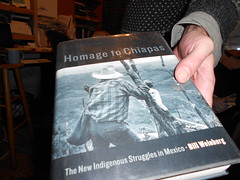Bill Weinberg is a nocturnal creature, generally writing from midnight to just before dawn in his Fourth Street apartment, a second-floor walk-up with a bathtub in the kitchen and a bathroom in the hallway. He’s lived in the book-lined space since 1989, and has lately been engaged, he said, in “the nitty gritty of defending my apartment as one of the last rent-stabilized holdouts in the building.”
The political journalist and left-wing anarchist is no stranger to such fights: last March his long-running show, the Moorish Orthodox Radio Crusade, was canceled by WBAI-FM (99.5), the “free speech radio” station where he had discoursed for nearly 20 years on topics such as the war in Iraq, the Arab Spring, and the 1988 Tompkins Square Park riots. The station, part of the Pacifica radio network, has not offered any official comment on the cancellation. But Mr. Weinberg said he got into hot water with management for disrespecting fellow producers on air, including Gary Null, a health guru whom he had denounced as a quack and an AIDS denier.
Nearly a year after his ouster, Mr. Weinberg keeps busy by maintaining the World War 4 Report, a Website dedicated to “deconstructing the war on terror” (he also edits the Global Ganja Report and New Jewish Resistance). In two weeks, he’ll go to Peru, on assignment for The Progressive, to cover a national movement for water rights at the U.S.-owned Conga gold mine project. The subject is part of his long languishing manuscript for a book about indigenous and ecological struggles in Latin America.
Mr. Weinberg’s first book on the topic, “War on the Land: Ecology and Politics in Central America,” grew out of his nomadic hippie days when he blockaded nuclear power plants in California and later “vagabonded” down to Mexico and Central America. His second, “Homage to Chiapas: The New Indigenous Struggles in Mexico,” recounts a 1994 uprising by the Zapatistas.
During a recent conversation with The Local, Mr. Weinberg said the loss of his radio show was a gain in some ways, noting that his writing career had improved “marginally” without the distraction of the weekly program. “I’m over it,” he said of the show’s demise.
But it’s clear he enjoyed his time hosting the Moorish Orthodox Radio Crusade. Founded by Peter Lamborn Wilson, it was billed as “Anarchism for the global city,” with Mr. Weinberg playing music that included Voodoo and Sufi chanting. “It was a labor of love and a labor of angst because there was no money in it,” he said. “I put money in it. I had to buy the music.”
Mr. Weinberg, who wasn’t paid for his work as a producer, said he was distressed by what he described as “toxic” material about 9/11 and varied conspiracy theories packaged in DVDs as premiums – gifts offered to WBAI supporters during the station’s fundraising drives. One such DVD was an installment of the “Loose Change” film series, which contends that the fall of the World Trade Center was an inside job perpetrated by sources in the U.S. government.
Mr. Weinberg’s demise was precipitated, he said, when in 2009 he assailed WBAI for promoting a “Zeitgeist” film segment prominently featuring an interview with New Age conspiracy author David Icke, who, Mr. Weinberg said sardonically, believes the world is run by “shape-shifting reptilians from the fourth dimension,” some with Jewish names.
“There’s a big anti-Semitic streak through all this conspiracy stuff and it’s ultimately reactionary,” said Mr. Weinberg. “A right-wing view of the world.”
Mr. Weinberg considers his dismissal as unjustified and an act of censorship. “This is the station that’s supposed to be about free speech and democracy and all those highfalutin words that they throw around,” he said. “This is spitting in the face of all that,” he went on, alluding to WBAI’s legacy of airing uninhibited icons of the counterculture like Allen Ginsberg, William S. Burroughs and Abbie Hoffman.
Rummaging through his files, he found a letter dated March 14, 2011 from station program director Tony Bates, stating that WBAI had decided to sever its relationship with him for repeatedly breaking what Mr. Bates considered a “cardinal rule” against “denigrating other producers on the air waves.”
Mr. Bates and Berthold Reimers, general manager of the financially challenged station, did not respond to messages requesting comment on Mr. Weinberg’s exit. But Mitchel Cohen, who chairs the Local Station Board of Directors of WBAI, said in a telephone conversation that despite his own disagreements with Mr. Weinberg (“I have a great picture of Bill giving me the finger in Washington Square Park, he said), he had opposed the show’s cancellation.
Mr. Cohen, a poet and social justice activist who ran for mayor of New York City on the Green Party ticket in 2001, said he didn’t agree with Mr. Bates’s decision to move Mr. Weinberg’s program from midnight to 2 a.m. But he insisted that Mr. Weinberg had not been censored for speaking out about the premiums, noting that other producers had also criticized them.
He claimed Mr. Weinberg’s show had been canceled because it had “lost its vibrancy” with the departure of his co-host Ann Marie Hendrickson. “Bill was an excellent journalist when it came to ecological issues in Mexico and Latin America, but in the last seven or eight months of the show, he had become increasingly crotchety with his bad-mouthing other producers,” said Mr. Cohen. “That was a no-no even though I think there’s a place for that. But the program director didn’t appreciate it.”
Ms. Hendrickson, a writer and librarian who was Mr. Weinberg’s co-host for 13 years, said he was a “New York curmudgeon who should be back on the air.” She characterized Mr. Bates as “aggressively anti-intellectual.”
Max Schmid, the host of “The Golden Age of Radio” and an operations assistant at WBAI who helped Mr. Weinberg produce his show over the years, said he was appalled by some of the popular 9/11 conspiracy premiums offered by the station, and said Mr. Weinberg was right to criticize them on air. “But he went about it the wrong way,” Mr. Schmid said. “WBAI has always been a highly politicized atmosphere. People take sides and Bill’s [show] became anti-management. It was way too much for his audience, for management and for himself.”
Despite his ruptured relationship with WBAI, Mr. Weinberg said he was optimistic about the world and his place in it as a voice on the radical left. “Every year since 9/11, I had became more pessimistic until this past year,” he said. “This is one year where I can say at the end of the year that I actually feel more optimistic than I was a year ago despite losing my radio show.” Peppering his words with a couple of enthusiastic expletives, Mr. Weinberg continued: “It’s because of Occupy Wall Street, The Arab Spring and the wave of revolution all over the world. It’s the first glimmer of hope that I’ve seen in ten years.”





